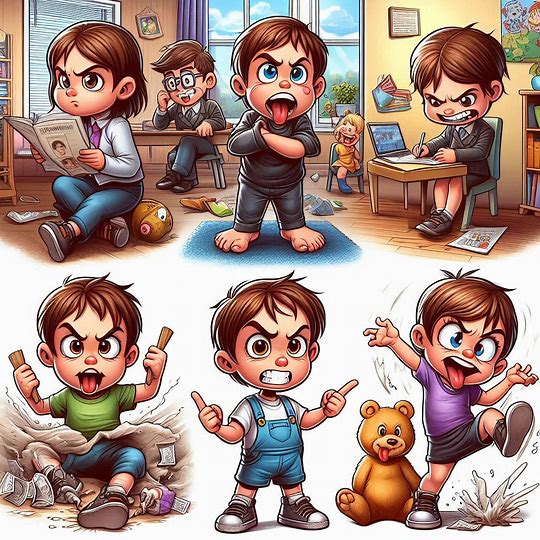Emotional Intelligence, or EQ, is defined as the ability to recognize, understand, manage, and express one’s own emotions and the emotions of others. Unlike physiological indicators, EQ is not innate but can change over time, especially through an individual’s efforts and training. Improving emotional intelligence is not just about applying a skill or strategy, but about developing habits to maintain every day.
The question that many people are asking today is: “Why is emotional intelligence more important than ever?”.
Answering this question, Dr. Jeffrey Bernstein, a psychologist specializing in child education methods and author of the book “10 Days to a Less Defiant Child,” said: “A person with high EQ will understand themselves, easily get along with others, and realize their dreams. Emotional intelligence brings not just happiness and health, but is also the key to success. It helps you become confident, attractive, influential, and build a good image in the eyes of others. In addition, EQ also contributes to improving imagination, thinking ability, and aesthetic taste.”
From this, we can see the crucial role of emotional intelligence in happiness and achievements in life. For parents, supporting children in developing EQ from an early age through positive education methods is extremely important. One of the first steps in this journey is to identify whether your child may fall into the group of children with low EQ.

EQ Contributes to Improving Imagination, Thinking Ability, and Aesthetic Taste
Defeating Others With Words
Children with low emotional intelligence (EQ) tend to be selfish and insensitive to the feelings of others. These children often struggle to put themselves in others’ shoes and are quick to criticize and expose their faults. They use words to hurt others without considering their feelings.
When someone only wants to win a conversation by belittling others, it’s not just communication; they are actually trying to assert themselves and hurt the other person. Most of the time, these people do not realize the tremendous harm their behavior causes. Even if they seem to be the winner in the interaction, deep down, they often feel lonely and are shunned by those around them.
On the other hand, those with high EQ rarely “rub salt in the wound.” They are usually sensitive and attentive to the emotions that others are experiencing. Instead of criticizing or accusing others, they listen and respect the opinions of their counterparts. This not only helps build good relationships but also keeps the communication atmosphere positive and friendly.
Lack of Emotional Control
One of the distinctive characteristics of children with low emotional intelligence (EQ) is their inability to control their emotions. This is often manifested by frequent anger and negative behaviors.
According to Professor Li Mai Jin (China), behaviors such as shouting, crying, breaking toys, or tearing books indicate that children are having difficulty managing their emotions. These behaviors are not just reactions but also reflect a lack of self-regulation. She also emphasizes that parents should pay special attention when observing these manifestations in their children.
To help children improve their emotional control, Professor Li offers some advice for parents. The most important thing is to stay calm and apply the “4 Don’ts and 1 Do” method: don’t scold, don’t spoil, don’t preach, and don’t leave your child alone when they’re struggling with their emotions.
Parents should make time for their children to stabilize their emotions on their own, sitting by their side without intervening too much, and waiting until they regain their calm and realize their mistakes. When the child has calmed down, listen to them and try to understand the reasons behind their negative emotions, and then work together to find appropriate solutions.

Parents Should Make Time for Their Children to Stabilize Their Emotions
Inability to Accept Criticism
Many children today tend to have a psychology that cannot accept any criticism or negative comments about themselves. Instead of being willing to listen, these children often expect praise and affirmation from adults. When faced with opposing views, they may react extremely, crying, shouting, or even acting violently towards objects around them. This is indeed a typical sign of low emotional intelligence (EQ).
In such cases, the proverb “bitter medicine cures disease” is an important maxim for parents to remember. It is essential for parents to be patient and wait until the child calms down. Then, they can gently guide their children to distinguish right from wrong, helping them realize that accepting different opinions is necessary for their development and self-improvement. This way, children will learn to face and deal with their emotions more effectively in the future.
Lack of Manners
Many parents may have felt helpless when dealing with children who refuse to listen and are stubborn. These children are often carefree and rebellious, showing no fear or respect even for their parents. When interacting with others, they can easily become mischievous and disruptive without feeling remorse.
Some parents may justify their child’s behavior by saying that they are still young and do not understand, and thus overlook their inappropriate behavior. However, in reality, parents need to identify and intervene timely when their children lack manners, have unpredictable behavior, and frequently cause trouble.
If parents continue to indulge and overlook their children’s mistakes, it could lead to serious consequences in the future. Proper education and discipline from the beginning will help children develop a positive attitude and respect for social rules.

Children Who Complain a Lot
One of the signs that a child has a low emotional quotient (EQ) is their tendency to complain constantly, criticize others frequently, and shirk responsibility for their actions. These children often cannot recognize their own faults but look for external reasons to justify their wrongdoings. This reflects not only low EQ but also a lack of self-confidence and courage.
According to Professor Li Mai Jin’s analysis, if parents do not pay attention and take appropriate corrective measures, this behavior can lead to children developing a blaming mindset, becoming envious, and having difficulty getting along with others. These traits will hinder their ability to make friends and build a happy life.
To help children develop comprehensively, parents should set a positive example by admitting their mistakes and apologizing when necessary. This will teach children that admitting fault is not shameful but an important skill in life.
Parents also need to seriously instruct their children that no one wants to be friends with someone who is grumpy, badmouths others, or blames others for their problems. Help them realize that these actions are wrong and need to be stopped immediately to build good relationships with those around them.
Learning Tips for Parents: 12 Japanese Techniques to Use with Your Children
 Parents: 12 Japanese Techniques to Use with Your Children’>
Parents: 12 Japanese Techniques to Use with Your Children’>Discover the 12 principles of teaching children in the traditional Japanese way that parents can learn with Dien May XANH! By instilling these principles when your children are young, you can ensure that they grow up to be obedient, smart and polite, the hallmarks of a successful education in Japan.
Mothers’ Need for Awareness of Dual Activity of Breastfeeding and Watching TV
In the contemporary world, in which technology pervades our lives, some mothers tend to soothe their babies through nursing while simultaneously watching television. Although this practice may not appear to affect the infant, studies show that it can in fact have dire repercussions on the baby’s well-being, both in terms of physical health and mental growth. In this article, we will look at the possible reasons for this activity and its potential outcomes.



































